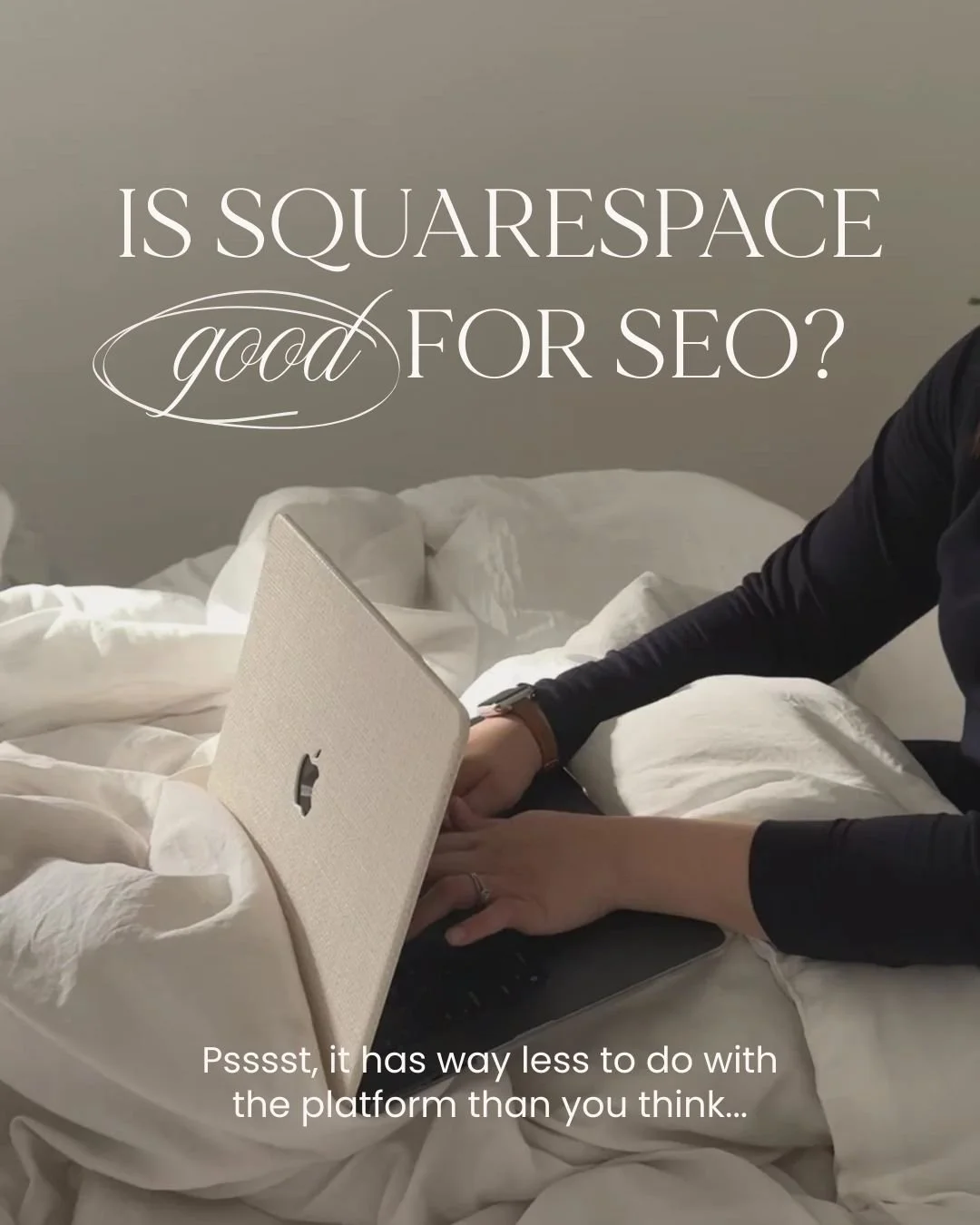Is Squarespace Good for SEO? Why Your Content Matters More Than Your Platform
If you’ve ever Googled “is Squarespace good for SEO?” you’ve probably seen a million different answers. Some people will swear that WordPress is the only way to rank on Google. Others will tell you Squarespace is “bad” for SEO. And honestly? Neither is true.
Here’s the reality: all platforms have the technical basics you need to show up on Google.
Squarespace, WordPress, Showit, Wix… they all let you:
Add alt tags to your images
Use heading structures (H1, H2, etc.) for your content
Optimize your image sizes for faster load times
Add page titles, meta descriptions, and slugs
So if you’re stressing that your site won’t rank just because it’s built on Squarespace - take a deep breath. You’re fine.
But here’s the part most people don’t want to hear: your SEO success has way less to do with your platform and way more to do with your copy.
The Real Secret to SEO (That Has Nothing to Do With Squarespace)
Search engines like Google aren’t sitting there judging your platform. They’re judging your content.
That means:
Are you using keywords your dream clients are actually searching for?
Is your website copy clear, relevant, and valuable?
Do you update your site (or blog) regularly with fresh content?
Does your website answer the questions your clients are already typing into Google?
You could have the most beautifully optimized Squarespace site in the world - perfect alt tags, flawless headings - but if your copy is vague, keyword-free, or never updated, Google won’t have a reason to show it.
On the flip side? You could have a simple Squarespace site with consistent, keyword-rich blog posts, and you’ll blow a fancy, overbuilt WordPress site out of the water.
How to Improve SEO on Squarespace (Without Losing Your Mind)
Here’s where to focus your energy:
Get your basics right.
Use one H1 per page (your main title).
Break up content with H2s and H3s.
Add alt text to every image (describe what’s in the picture & use your keywords).
Keep your image sizes under 500KB so your site loads fast.
Do your keyword homework.
Think about what your clients would actually type into Google. Instead of “luxury floral design” (too vague), maybe it’s “luxury wedding florist in Tuscany” or “NYC modern bridal bouquet designer.”Write for humans first.
Your copy should sound natural, like you’re talking to a friend. Keywords should fit in seamlessly, not be stuffed in like robot text.Stay consistent.
Regularly update your blog or resources section with content that answers your clients’ real questions. This signals to Google (and your audience) that you’re active and relevant.
So, is Squarespace good for SEO?
Yes - as long as you use the tools it already gives you.
No - if you expect the platform alone to magically get you to page one.
Your platform is the foundation, but your content is the fuel.
When your copy is keyword-rich, relevant, and consistent, it won’t matter whether you’re on Squarespace, WordPress, or a site you coded yourself.
So don’t get caught up in the “best platform” debate. Put your energy where it actually counts: your words, your message, and your value. That’s what makes Google (and your dream clients ) pay attention.
Tips for Creating Engaging Website Content
Okay, so we’ve established that content is the real SEO MVP. But what does good content actually look like? It’s not about writing long, boring blog posts stuffed with keywords. It’s about creating content that’s:
✨ Helpful → answers real questions your dream clients have.
✨ Engaging → written in a way that feels human, not robotic.
✨ Strategic → connected to your offers and how you can help.
Here are some simple ways to create content that works:
1. Answer Your Clients’ Questions
Think about the things your clients ask you all the time, those DMs, emails, or FAQs. Each one of those is a potential blog post or web page section.
Example: Instead of “Why SEO Matters,” try “How to Get More Clients from Your Squarespace Website.”
2. Create Content That Shows Your Expertise
Write about topics that showcase what you know while helping your audience.
If you’re a wedding planner → “5 Things to Do Before Booking a Venue.”
If you’re a wellness coach → “How to Build a Daily Ritual Without Burning Out.”
If you’re an interior designer → “3 Layout Mistakes That Make Small Rooms Feel Smaller.”
This builds trust and gets keyword-rich content on your site.
3. Keep It Clear and Conversational
Your content should sound like you. Avoid heavy jargon or writing like a textbook. Short paragraphs, everyday language, and clear explanations are key. Google loves content that people actually stay and read.
4. Mix Evergreen and Timely Content
Evergreen: Content that will always be relevant (like “How to Write a Killer About Page”).
Timely: Content tied to current trends, seasons, or questions (like “Wedding Website Trends for 2025”).
The combo helps you stay relevant now and build long-term SEO power.
5. Use Keywords Naturally
Don’t overthink it. Keywords are just the words your clients would use. Sprinkle them in your headings, body text, and meta descriptions in a way that feels natural… no “robot voice” required.
Want to dive deeper into SEO? Check out our Squarespace SEO Mastery - an easy, step-by-step guide to help your website get found by the right audience
Why This Matters for SEO and Your Business
Ok so here’s the thing: Google doesn’t just want to send people to any website. It wants to send people to websites that give value. When your site answers real questions, showcases expertise, and feels enjoyable to read, visitors stay longer, click around, and are more likely to book or buy.
And Google notices all of that.
Yes, Squarespace gives you the technical setup you need. But the real game-changer is this: consistent, relevant, high-quality content.



